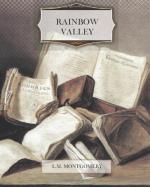In a little nest in the hay a girl was curled up, looking as if she had just wakened from sleep. When she saw them she stood up, rather shakily, as it seemed, and in the bright sunlight that streamed through the cobwebbed window behind her, they saw that her thin, sunburned face was very pale under its tan. She had two braids of lank, thick, tow-coloured hair and very odd eyes—“white eyes,” the manse children thought, as she stared at them half defiantly, half piteously. They were really of so pale a blue that they did seem almost white, especially when contrasted with the narrow black ring that circled the iris. She was barefooted and bareheaded, and was clad in a faded, ragged, old plaid dress, much too short and tight for her. As for years, she might have been almost any age, judging from her wizened little face, but her height seemed to be somewhere in the neighbourhood of twelve.
“Who are you?” asked Jerry.
The girl looked about her as if seeking a way of escape. Then she seemed to give in with a little shiver of despair.
“I’m Mary Vance,” she said.
“Where’d you come from?” pursued Jerry.
Mary, instead of replying, suddenly sat, or fell, down on the hay and began to cry. Instantly Faith had flung herself down beside her and put her arm around the thin, shaking shoulders.
“You stop bothering her,” she commanded Jerry. Then she hugged the waif. “Don’t cry, dear. Just tell us what’s the matter. We’re friends.”
“I’m so—so—hungry,” wailed Mary. “I—I hain’t had a thing to eat since Thursday morning, ’cept a little water from the brook out there.”
The manse children gazed at each other in horror. Faith sprang up.
“You come right up to the manse and get something to eat before you say another word.”
Mary shrank.
“Oh—I can’t. What will your pa and ma say? Besides, they’d send me back.”
“We’ve no mother, and father won’t bother about you. Neither will Aunt Martha. Come, I say.” Faith stamped her foot impatiently. Was this queer girl going to insist on starving to death almost at their very door?
Mary yielded. She was so weak that she could hardly climb down the ladder, but somehow they got her down and over the field and into the manse kitchen. Aunt Martha, muddling through her Saturday cooking, took no notice of her. Faith and Una flew to the pantry and ransacked it for such eatables as it contained—some “ditto,” bread, butter, milk and a doubtful pie. Mary Vance attacked the food ravenously and uncritically, while the manse children stood around and watched her. Jerry noticed that she had a pretty mouth and very nice, even, white teeth. Faith decided, with secret horror, that Mary had not one stitch on her except that ragged, faded dress. Una was full of pure pity, Carl of amused wonder, and all of them of curiosity.
“Now come out to the graveyard and tell us about yourself,” ordered Faith, when Mary’s appetite showed signs of failing her. Mary was now nothing loath. Food had restored her natural vivacity and unloosed her by no means reluctant tongue.




